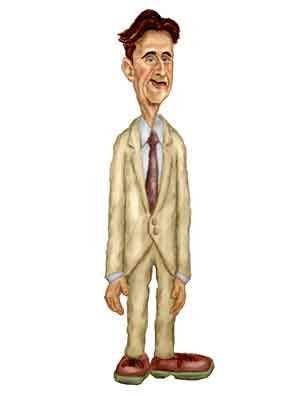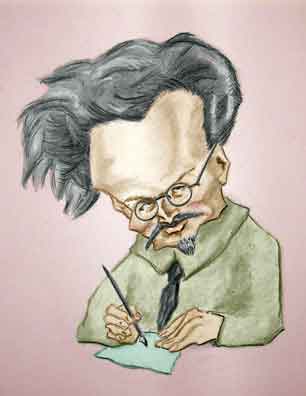George Orwell

George Orwell
A Trotskyite with Big Feet?
Known to legions of middle and high school students as the author of Animal Farm, Eric Blair - better known as George Orwell - was even a better writer than than you might think from reading from this amusing but - alas - now rather useless book. Ironically, it's the very uselessness of the novel and its successor, George's opus magnus 1984, that ensures they will be required reading in America's schools and will continue to be enthusiastically hailed by the very people whose praising would have left George, were he alive today (and as Yogi Berra might have put it), rolling over in his grave.
But without doubt George's real ability was as an essayist and, his best writing is found in the four volume Collected Essays, Journalism, and Letters of George Orwell. Officially out of print, these volumes can still be found in used bookstores or online, either as sets or as the individual volumes: 1) An Age Like This (covering 1920-1940), 2) My Country Right Or Left (from 1940 to 1943), 3) As I Please (1943-1945), and 4) In Front Of Your Nose (1945-1950). No one has the right to call themselves a former liberal unless they own (and have read) these volumes.
Throughout it all, George was a firm believer in socialism and spent over three years as the literary editor of the socialist newspaper-slash-magazine, the Tribune. So it's all the more ironic that the world increasingly hails Animal Farm as the quintessential anti-socialist and (even more laughable) pro-American fable. Even more misunderstood was George's last book 1984. After it came out, George felt obliged to state explicitly it was not an attack on socialism.
Instead Animal Farm is a direct allegory about the Russian revolution and its aftermath with all the characters easily identified with their real life counterparts. With that book and 1984 George was trying to make the point that leaders of political revolutions, however well meaning at first, will soon revert to self-interest and will elevate themselves to a privileged class with special benefits not available to the average citizen. The net gain of revolutions, then, is zero. Americans, though, thump their collective chests in glee and point out how their revolution brought about equality to all. After all, it's unthinkable that in the world's most powerful country dedicated to the proposition that all men are created equal the system would degenerate to where decent health care, income security, and adequate pensions would end up being available only for to those at the highest levels of government, the entertainment industry, and business.
Hm.

Leon Trotsky
Was George a Follower?
George was a contradictory man. He couldn't stand intellectuals, but was a journalist and literary critic with friends in academia. George hated Russian-styled communism and any kind of totalitarianism, but was accused of being a follower of Leon Trotsky (George was even dubbed by the early science fiction writer H. G. Wells as "that Trotskyite with big feet" ). A man who believed in tolerance, George could go into spittle flinging diatribes about groups who advocated (then) fringe platforms such as vegetarianism, birth control, and - at times - socialism. He would write hasty and ill-thought rebuttals (even a friend called them irrational) to people who held contrary opinions and then immediately seek out their friendship. He recognized the dangers of nationalism, but was fervently patriotic toward England. Above all he hated having to crank out "hack journalism" for a living (the description is George's), but that's where he wrote at his best.
Because most people have forgotten George's dedication to socialism, it's become almost heresy to disagree with him. For instance, George's essay "Politics and the English Language" is largely responsible for the on-going War Against the Passive.
What did George say about the passive? Well, George gave some examples of bad writing and he points out:
In addition, the passive voice is wherever possible used in preference to the active, and noun constructions are used instead of gerunds (by examination of instead of by examining).
Interesting. In a sentence criticizing the use of the passive George actually uses the passive. And not once, but twice in the same sentence.
The passive voice was not really considered voice non grata until the early 20th century. The idea is that somehow the passive is less vivid and impersonal. The problem today is that many people sometimes confuse the passive voice (which is a technical grammatical verb form) with the vague notion of non-vivid writing. You'll even find professional writers go into spittle-flinging diatribes against what they say is an example of the passive when the verb was actually in the active voice!
Actually you should use the passive when you want to focus on the act accomplished by the verb, not the individual doing the action. This is why you often see - and properly use - the passive in technical writing while the active is more common in fiction and journalism.
Despite George's lifelong commitment to socialism, he also recognized the problems with its actual realization. The goal had to be raising the standards of the lower economic levels without pulling down that of the working middle class. Could socialism, he wondered, be implemented without it being simply common misery for all? All his life he had doubts that it could.
George died of tuberculosis in 1950 long before the fall of the Soviet Union (a fall he would have applauded) and long before he began to be hailed as an anti-socialist writer - praising that would have undoubtedly left him a-gagging.
References
George Orwell: A Life, Bernard Crick, Little, Brown and Co. (1980). Probably the definitive life although perhaps a bit academic for some.
The Crystal Spirit: A Study of George Orwell, George Woodcock, Little, Brown, (1966). A critical review of Orwell's work with some biographical information and personal recollections by the Canadian writer, George Woodcock. Woodcock, an anarchist, wrote a letter to the Tribune objecting to Orwell's views about pacifism. As usual Orwell published a spittle flinging diatribe in rebuttal, and then extended a friendly invitation to Woodcock to take part in a BBC broadcast, an invitation Woodcock accepted.
Orwell for Beginners David Smith and Melinda Gebbie, Writers and Readers (1984). Not as editorially partisan as some other volumes in the series (such as Reagan for Beginners), this book gives an excellent and objective explanation of George's politics and philosophy. When addressing the issue of whether H. G. Wells was correct in calling George a "Trotskyite with big feet", the authors said it was both true and false. Yes, they said, Orwell's feet were enormous, but he was not a Trotskyite.
"Active Resistance: What We Get Wrong About the Passive Voice", Jan Freeman, Boston Globe, March 22, 2009.